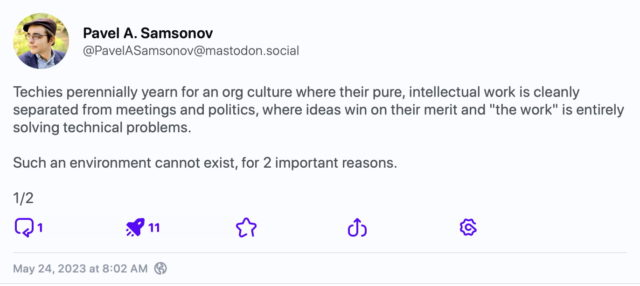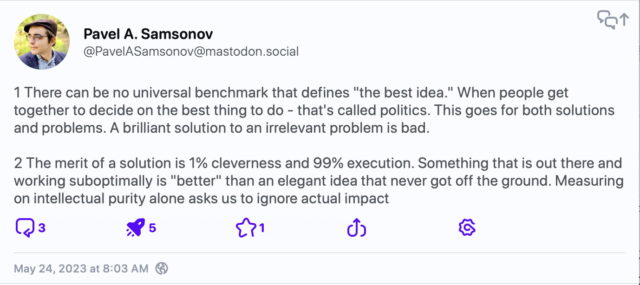This is another COVID-19 entry. It’s a long one, and it’s not a very positive entry, because my feelings about it can be summed up thus:
In the United States, the pandemic is as over as it’s going to get. You may or may not feel that the pandemic is “over”, but I don’t believe it’s ever going to get more over than it is now. At least in my lifetime, and maybe in that of anyone alive today.
I’ll talk about why I think this further down, but I want to lead with what this means for us in our day-to-day lives. It means that the world isn’t going to become much more comfortable for you than it is now. Cases may go up and down, extra measures may come and go, but if you’re not comfortable doing things now, the only way you’re going to get more comfortable is by adjusting your own mind. And if you’re convinced that your current comfort levels are warranted, then what you’re comfortable doing now is what you’ll be comfortable doing for the rest of your life.
For example:
- If you’re not comfortable eating at a restaurant, nothing’s going to change in the future to make you feel more comfortable. More likely I think there will be fewer restrictions on restaurant patrons with respect to masking and vaccinations over time.
- If you’re not comfortable flying on an airplane, that’s not going to get better either. (From what I’ve read, flying is one of the least-risky group activities, but it’s not surprising that our lizard brains look at flying in a narrow metal cylinder with a couple hundred other people and think “Nope.”)
- If you’re not comfortable going to work in a group environment – an office, a retail store, a warehouse, or wherever – that’s not going to get any better. (And I bet we’ll see employers start pressuring people to return to in-person work in the next year. Or, at the latest, in 2025 if the Republicans capture the White House and Congress.)
- If you’re not comfortable going to an art fair, movie, concert, wedding, funeral, or other event where there will be lots of people around, indoor or outdoor, masked or not, don’t expect much to change in these areas either.
- If you’ve been looking forward to getting to the point where you don’t need to wear a mask to suppress the transmission of COVID, don’t expect the need for that to change either. But don’t be surprised if lots of other people decide that they’ve had it with masks and just stop wearing them unless required to (and also expect requirements for masking to slowly go away over the next few years).
When people talk about “the pandemic being over” or “the pandemic not being over yet”, or “the pandemic ending”, I don’t think things have appreciably changed in the U.S. in the last few months, and I don’t think they’ll appreciably change in the future – ever. There’s never going to be less need for mask wearing, physical distancing, and avoiding crowds or indoor events, until and unless there’s some significant unforeseen development.
I am not an infectious disease expert, so there may certainly be important things I don’t know. But here’s why I feel this way:
- A little under 60% of the U.S. population is fully vaccinated. This is likely to continue rising slowly (with a slightly larger bump this month and next as 5-11 year olds get vaxxed), but I think it’s likely that we’ll peak at around 70% vaxxed. I suspect that last 30% will never get vaccinated voluntarily.
- More importantly, only about 42% of the world population is fully vaxxed, and that also needs to get much, much higher. I bet it will peak at around the same level as the U.S. – around 70% – or possibly a bit higher if more authoritarian governments impose vaccinations requirements than prohibit them.
- The SARS-CoV-2 virus which causes COVID is never going to go away. Even if we manage to eradicate it among humans – which I doubt we will – it’s likely to survive in animals (such as deer) and retransmit back into humans periodically.
- The existing COVID vaccines are great at preventing infections and preventing serious symptoms against those with breakthrough infections, but it doesn’t eliminate transmission even among the vaccinated, and I believe we’ll never get to the much-greater-than-90% vaccination rate we need for vaccination to eradicate the virus among humans.
An important caveat is that I believe all of this to be the case assuming there are no unexpected developments. By “unexpected” I mean developments that we either don’t know about or don’t expect will happen. I think we can reasonably expect the world to get to a 70% or slightly higher vaccination rate, but getting to a rate of true herd immunity – above 90% – does not seem like something that’s reasonable to expect.
I think there are reasons for hope among things we could imagine happening, though. Here are some of those unexpected developments which could make a significant impact:
- Better treatments for COVID symptoms are developed. There are two anti-viral pills which have been announced recently, and hopefully there will be more. This could mitigate the impact of people getting infections to the point that it really is like getting the flu rather than getting a dripping illness (not that the flu is anything to laugh at). It’s not clear to me that this will really move the needle in changing the need for masking, etc., but it might.
- New, more effective vaccines are developed. I doubt anyone who isn’t researching such vaccines or in close touch with such people has any sense whether this is likely to happen. I’m optimistic that we will create better vaccines, maybe even one which prevents transmission or otherwise significantly reduces the spread of COVID among humans. I think this is the most likely path to returning life to complete pre-pandemic “normal” (for the vaccinated, anyway).
- We achieve herd immunity levels of vaccination. As I said, I think this is pretty unlikely, but it’s possible.
- COVID evolves to be basically harmless to humans. There’s a long-standing theory that viruses can evolve in this way, but there seems to be little evidence that this actually happens. (This may be what happened to the 1918 influenza virus.)
- Humanity evolves immunity to COVID. Seems unlikely, and if it does it might only happen for future generations.
The other wild card is that the virus itself could evolve in various ways. (In a sense Delta has been a boon, because I’ve read that its high transmissibility without being much more deadly than the original virus might be blocking more deadly mutations from taking hold. They can’t replicate and transmit fast enough to beat out Delta.) The really bad mutation, of course, would be one that reliably breaks through the vaccines. Another bad one is that it might become more deadly to the unvaccinated but not substantially worse for the vaccinated.
This brings me to one of the worst parts of all of this, which is the thousands – maybe millions – of people who are unable to be vaccinated. While for people who can’t be vaccinated because of a reaction to something in the vaccine there is some hope that a vaccine might be reformulated to eliminate that problem, for the many others who are immunocompromised such that the vaccine either wouldn’t work for them or might itself be harmful, I don’t see a way forward. This is of course one of the main reasons why we needed to squash the virus through universal vaccination, but as I said I don’t think we’re going to achieve a high enough vax rate to do that, and so the unable-to-be-vaccinated are going to be stuck. While they can mask and physical distance like anyone else – like we did before vaccines – neither of those is a solution, it’s just a stopgap measure, especially in a world where many other people – both vaxxed and unvaxxed – will likely be doing less of both in the future. I expect many tragic stories in the future. We as a society are failing these people because of the shitheads who choose not to get vaccinated.
(This is one reason that I have little sympathy left for people who are unvaccinated by choice, catch COVID, and then die or experience long COVID. They made their choice, and it was the one that basically said fuck everyone else.)
A few days ago the New York Times published this piece which includes interviews with Dr. Bob Wachter, whom I’ve been following on Twitter for his COVID analysis over the last year and a half. He – and the piece’s author – make some points which are similar to my thoughts here. The point that we will likely transition to looking at illness counts rather than case counts as the factor which dictates how we adjust our precautions seems right on to me. Case counts are going to go up and down among the whole population, forever, but more and more of those cases will be vaccinated people testing positive but having no significant illness as a result of the virus. What this means for masking, and testing, and other measures remains to be seen. What exactly happens probably depends on to what extent people are willing to endure those measures. I don’t really have a guess as to what will happen – after all, we put up with an awful lot of security theater nonsense in order to fly.
But I think we’re now at the point where the substantive, enduring measures we can take have been taken, and the next few years will largely be us – as individuals and as groups – deciding what our social structures are going to evolve into.
Personally, I am so, so sick of working from home. But I don’t relish the prospect of wearing a mask for a whole day in the office, either. But at this point, what happens isn’t really up to me.


